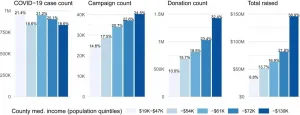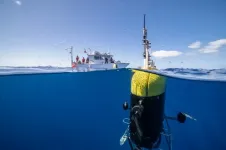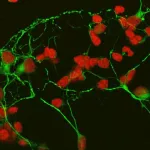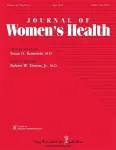(Press-News.org) During the first several months of the pandemic -- when communities locked down, jobs were lost, PPE was scarce and store shelves were cleared --thousands of people turned to online crowdfunding to meet their needs.
But a new University of Washington analysis of requests and donations to the popular crowdfunding site GoFundMe, along with Census data, shows stark inequities in where the money went and how much was donated.
A study published June 15 in Social Science & Medicine found more than 175,000 COVID-19-related GoFundMe campaigns in the U.S., raising more than $416 million, from January through July 2020. Researchers found that affluent and educated communities created more fundraising campaigns, and received more in return, than other communities with fewer resources.
What's more, researchers found that campaign success, overall, was hard to come by. Some 43% of campaigns didn't receive a single donation. More than 90% of campaigns didn't meet their goals.
Researchers say the study reveals the challenges inherent to online crowdfunding, as well as its capacity to reinforce existing socioeconomic divides.
"Our study shows that even though COVID-19 had an impact across the country, the places that benefitted most from crowdfunding were the places that already had the most resources available," said the study's lead author, Mark Igra, a graduate student in sociology at the UW.
While some results may not be surprising from an economic standpoint -- people in wealthier communities likely have more money to donate to charitable causes -- researchers say the results highlight other factors contributing to campaign success. For example, people in more educated communities are likely better able to tap into existing social networks to raise money -- whereas in communities where education is lower the needs may be greater, but residents may have fewer connections to affluent donors, and fewer campaigns reach their goals.
Other recent research has explored online crowdfunding specific to medical needs, finding that campaigns are common, but often unsuccessful, in communities where health care resources and insurance coverage are lacking. This study is believed to be the first to examine online crowdfunding as a broader crisis response, and its impacts on inequality.
In examining COVID-19-related fundraising campaigns that mentioned a need associated with the pandemic, such as a lost job and a need for food or rent money, researchers eliminated those that were part of a GoFundMe program providing matching funds for businesses, leaving about 164,000 campaigns to sort through. Because demographic data about crowdfunding users is hard to come by, researchers analyzed campaign data at a county level and compared it with other county-level socioeconomic characteristics using U.S. Census data. Among their findings:
The median campaign goal was $5,000, with a median of two donations and only $65 raised.
The top 1% of campaigns received nearly one-quarter of all the money raised.
As COVID-19 cases and unemployment rose in a variety of communities, more fundraising campaigns were created in communities with higher education and income levels.
Counties where 35% of residents are college graduates can expect about 50% more campaigns than counties where only 12% are graduates.
Counties with a median household income of at least $130,000 raised nearly $150 million, almost three times as much as counties with a median income of $19,000 to $47,000, even though the populations of those counties are about the same.
A keyword search of GoFundMe campaign requests found that those identifying business and medical needs yielded more donations than those campaigns that mentioned personal financial needs.
GoFundMe's approach of highlighting and promoting certain campaigns, whether those tied to a high-profile person or those that are gaining attention and growing at a faster rate, means success begets success, researchers said.
Co-author Nora Kenworthy, an associate professor of nursing and health studies at UW Bothell, said the study shows who's able to leverage resources in a crisis, and that the nature of online crowdfunding as a social media platform exacerbates the dynamics of a crisis.
"During the pandemic, there's been a lot of talk of communities supporting communities, but we need to ask, where does that happen, for whom, and who gets left out?" said Kenworthy. "The more we rely on social media platforms to shape that community response, the more we are blinded to where help is not happening and who's not getting assistance."
That's not to say crowdfunding doesn't serve a valuable purpose, the authors point out. It's more a sign "that we shouldn't shy away from more structural solutions," Kenworthy said, such as government-run programs that could cast a wider net than crowdfunding can cover.
"People's fundamental needs for health and well-being shouldn't be dependent on such an unpredictable source of funds. It's really a question of what is our shared commitment to the things people should have, regardless of whether they can be successful at crowdfunding," Igra said. "It's a good thing that people are helping, but people who aren't being helped aren't visible."
INFORMATION:
The study was funded by the National Science Foundation, the Center for Studies in Demography & Ecology at the UW, and the School of Nursing and Health Studies at UW Bothell. Additional co-authors were Cadence Luchsinger of the UW Department of Health Services and Jin-Kyu Jung of the School of Interdisciplinary Arts and Sciences at UW Bothell.
For more information, contact Igra at igra@uw.edu or Kenworthy at njk8@uw.edu.
'God forbid we need this, but we'll be ready'
Medication would be taken early in the disease, so you don't get as sick
Future drug could also treat common cold
CHICAGO --- Scientists are already preparing for a possible next coronavirus pandemic to strike, keeping with the seven-year pattern since 2004.
In future-looking research, Northwestern University Feinberg School of Medicine scientists have identified a novel target for a drug to treat SARS-CoV-2 that also could impact a new emerging coronavirus.
"God forbid we need this, but we will be ready," said Karla Satchell, professor of microbiology-immunology at Feinberg, who leads an international team of scientists to analyze the important structures of the virus. The Northwestern team previously ...
An innovative underwater robot known as Mesobot is providing researchers with deeper insight into the vast mid-ocean region known as the "twilight zone." Capable of tracking and recording high-resolution images of slow-moving and fragile zooplankton, gelatinous animals, and particles, Mesobot greatly expands scientists' ability to observe creatures in their mesopelagic habitat with minimal disturbance. This advance in engineering will enable greater understanding of the role these creatures play in transporting carbon dioxide from the atmosphere to the deep sea, as well as how commercial exploitation of twilight ...
CORVALLIS, Ore. - Human-caused wildfire ignitions in Central Oregon are expected to remain steady over the next four decades and lightning-caused ignitions are expected to decline, but the average size of a blaze from either cause is expected to rise, Oregon State University modeling suggests.
Scientists including Meg Krawchuk of the OSU College of Forestry and former OSU research associate Ana Barros, now of the Washington Department of Natural Resources, say the findings can help local decision-makers understand how a changing climate might affect natural and human-caused fire regimes differently and inform ...
Researchers at the National Eye Institute (NEI) have determined how certain short protein fragments, called peptides, can protect neuronal cells found in the light-sensing retina layer at the back of the eye. The peptides might someday be used to treat degenerative retinal diseases, such as age-related macular degeneration (AMD). The study published today in the Journal of Neurochemistry. NEI is part of the National Institutes of Health.
A team led by Patricia Becerra, Ph.D., chief of the NEI Section on Protein Structure and Function, had previously derived these peptides from a protein called pigment epithelium-derived ...
A study of young immigrant mothers who are survivors of sex trafficking found that the trauma affected how they parented: it made them overprotective parents in a world perceived to be unsafe, it fueled emotional withdrawal when struggling with stress and mental health symptoms, and was a barrier to building confidence as mothers. Yet, they coped with such challenges finding meaning in the birth of their child and through social support and faith.
Results of the community-based participatory research study by researchers at Columbia University ...
An alternate-day intermittent fasting schedule offered less fat-reducing benefits than a matched "traditional" diet that restricts daily energy intake, according to a new, 3-week randomized trial involving 36 participants. The study, which is one of the first to tease apart the effects of fasting and daily energy restriction in lean individuals, indicates that alternate-day fasting may offer no fasting-specific health or metabolic benefits over a standard daily diet. However, the authors caution that longer studies with larger groups are needed. Intermittent fasting, which involves cycling through voluntary fasting and non-fasting periods, has become one of the most popular approaches to losing weight. There ...
We've seen robots take to the air, dive beneath the waves and perform all sorts of maneuvers on land. Now, researchers at UC Santa Barbara and Georgia Institute of Technology are exploring a new frontier: the ground beneath our feet. Taking their cues from plants and animals that have evolved to navigate subterranean spaces, they've developed a fast, controllable soft robot that can burrow through sand. The technology not only enables new applications for fast, precise and minimally invasive movement underground, but also lays mechanical foundations for new types of robots.
"The biggest challenges with moving through the ground ...
In a study of more than 10,600 adult patients hospitalized with COVID-19, women had significantly lower odds than men of in-hospital mortality. They also had fewer admissions to the intensive care unit and less need for mechanical ventilation. Women also had significantly lower odds of major adverse events, including acute cardiac injury, acute kidney injury, and venous thromboembolism, according to an article in the peer-reviewed Journal of Women's Health. Click here to read the article now.
"This comprehensive analysis is the largest study to date that directly assesses the impact of sex on COVID-19 outcomes," ...
Boston - New study results indicate that different comorbid conditions affecting individuals diagnosed with COVID-19 may impact how long they continue to receive positive SARS-CoV-2 polymerase chain reaction (PCR) test results. Individuals diagnosed with COVID-19 who are aged 60+, have three or more chronic medical conditions, particularly diabetes, obesity, rheumatologic disease, or an organ transplant, have positive PCR tests for longer periods of time compared to younger individuals without these comorbidities. However, the data showed no significant difference in the duration of positive PCR tests results by the degree of immunocompromise or for individuals receiving chemotherapy or steroids ...
EAST LANSING, Mich. - The original Star Trek television series took place in a future when space is the final frontier, but humanity hasn't reached that point quite yet.
As researchers like Michigan State University entomologists Sarah Smith and Anthony Cognato are reminding us, there's still plenty to discover right here on Earth.
Working in Central and South America, the duo discovered more than three dozen species of ambrosia beetles -- beetles that eat ambrosia fungus -- previously unknown to science. Smith and Cognato described these new species on June 16 in the journal ZooKeys.
The Spartans also selected ...




